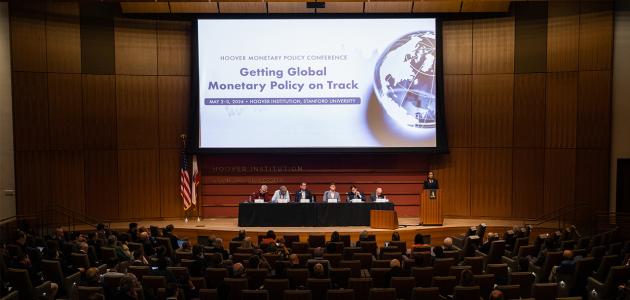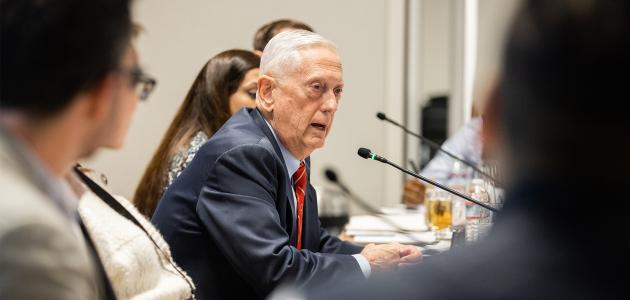
Welcome to the Hoover Institution’s briefing on national security. In this briefing, we are looking at understanding the triple threats faced in the Middle East, Europe, and the Pacific; the economic and military importance of rare earth minerals; the current usage of “intrawar deterrence”; defense budget woes; the problems with a Palestinian state; global finance and “weaponizing interdependence”; and the Monroe Doctrine and our borders. Finally, we highlight Russian activist Vladimir Bukovsky’s papers from the Hoover Library & Archives.
FEATURED ANALYSIS

A Trifecta of Threats
In their essay, Hoover senior fellow H.R. McMaster and his coauthor Bradley Bowman highlight the linkage between threats in the Middle East, Europe, and the Pacific. The authors state that “overlooking those connections results in missed opportunities to counter aggression and prevent violence from spreading.” Beijing, Moscow, Tehran, and Pyongyang are building partnerships and assisting each other militarily and monetarily. China supplies Russia with weapons for its fight against Ukraine, and the two have expanded their joint military exercises; Tehran and Beijing cooperate through Chinese investments for Iran and oil on the cheap for China; North Korea provides bullets and missiles for conventional and advanced military technology from Russia. As McMaster and Bowman caution, “Americans should realize that our adversaries appreciate the value of partners, and we should too. America's allies and partners are grand strategic assets to be strengthened and nurtured—not burdens to be jettisoned.” Ukraine, Israel, and Taiwan are “wise investments” and America’s actions in support of Ukraine and Israel “could have decisive implications for war and peace in the Pacific.”
More Priceless than the Hope Diamond
The recent discovery of 2.34 billion metric tons of rare earth materials in Wyoming is a game changer. As Hoover distinguished research fellow Michael Auslin argues, “This find … will give the US an unparalleled economic and geopolitical edge against China and Russia,” but only if the opportunity is seized on and properly and cleanly managed. As a cautionary tale, Auslin points to the Biden administration policies that have forced the United States from its spot as the world’s largest oil producer and fourth largest in coal production—all processed in a way that is “far cleaner and environmentally safe than China or India.” The same can be done for rare-earth mining as the knowledge is there. “Rare earths are fundamental to advanced economic manufacturing … and are also critical in all military technologies.” As Auslin exhorts, the US must press its “natural advantages.”

Mind Games
As Putin returns to rattling the nuclear saber in his pronouncements about the war in Ukraine, it is important to understand the use of this tactic, argues Hoover research fellow Rose Gottemoeller. This burst of threatening rhetoric has two aims: to send a message to Republicans on the fence over aid to Ukraine and to highlight the contrast to earlier, false alarms that nuclear attacks from Russia could be imminent. Gottemoeller describes such chatter as “intrawar deterrence.” Military, diplomatic, and media channels have all been used in this “mysterious mind game.” The author posits that in many ways it has been used by all sides to prevent nuclear escalation, adding, "We need to keep it that way.”
Money Well Spent
Hoover senior fellow Michael Boskin and coauthor Kiran Sridhar argue that Biden’s 2025 defense budget is woefully inadequate. “While America’s military remains the strongest and most capable in the world, our advantage over potential adversaries has been shrinking rapidly. We must do better if we are to deter our enemies.” They write that Biden has focused more on sanctions than on advancing military capabilities and propose that $100 billion or more per year is needed to build up the navy, the army, missiles, fighters, bombers, and capabilities in cyber and space, to name a few. Reforms are also needed to make the Pentagon more effective. The authors write that while there is cause for optimism with regard to defense spending, “as Reagan showed, only a determined president can persuade a war-weary public and wary Congress to support the sustained investment in national security that is the foundation of freedom, peace and prosperity.”

Change of Direction
Hoover senior fellow Russell Berman turns the Palestinian question on its head and argues that the creation of a Palestinian state alongside Israel not only poses an existential threat to its neighbors but erodes American security. In emphasizing that the Biden administration’s ultimate objective is the Arab-American vote in Michigan, he carefully describes the consequences of such an outcome: an entity that would soon be governed by Hamas, that could threaten by its “democratic example” the foundations of the Jordanian monarchy, and that would exhibit to the world the fickleness of American fidelity to allies. “For the US, the Palestinian question should be foremost about the effectiveness of American power in the region … and credibility throughout the world.”
Sticky Fingers
Hoover visiting fellow Christopher Ford details the strategy behind “weaponizing interdependence”—through control of networks of global finance—to encourage US policymakers in the use of this tool as well as to build awareness of China’s facility with it. With the work of Henry Farrell and Abraham Newman as a point of reference, Ford argues for the use of economics as an instrument of statecraft in controlling the networks to which large parts of the globe are connected. The dollar-based financial structure is the most immediately manipulated by Washington and therefore most effective. Following our withdrawal from the JCPOA and the imposition of crippling sanctions, Iran tried and failed to establish a non-dollar-based trade network with Europe. Ford argues for similar “chokepoint” effects in slowing Beijing’s acquisition of high-technology items. As Ford states, “Our leaders can’t be good stewards of our economic or our national security interests if they don’t understand the dynamics and challenge related to the weaponization of economic interdependence.”

In the Neighborhood
The Americas are home to over a billion people, and the well-being of our southern neighbors is a vital national security interest, writes Hoover fellow Joseph Ledford. “Failure to secure the Western Hemisphere is strategic malpractice.” Biden administration initiatives have done little to either counter Chinese, Russian, and Iranian influence in Latin America or secure the border. He highlights the extensive global network of transnational criminal organizations as well as hostile foreign powers. Ledford insists that “the United States retains the institutional capacity to foster greater regional security” and he offers examples of how we might go about implementing them in the region to “safeguard its prosperity and peace and work toward stabilizing the world order that the United States guarantees.”
HISTORY IN FOCUS
Expelled from school in 1959 for publishing a satirical magazine, Russian activist Vladimir Bukovsky (1942–2019) was arrested several times afterward, spending a total of twelve years (out of his thirty-four in the Soviet Union) in various prisons, labor camps, and psychiatric hospitals before being deported to Switzerland. He later settled in England on December 18, 1976, in exchange for the Chilean communist leader Luis Corvalan. A few months later, in March 1977, he met with President Jimmy Carter at the White House. A cofounder, in 2004, of an umbrella organization of the Russian democratic opposition, Bukovsky aimed to run in the 2008 Russian presidential election, but Russia's Central Election Commission denied his candidacy. Bukovsky participated in the international symposium "Building on Success: The Soviet Dissident Movement and American Foreign Policy during the 1980s" at the Hoover Institution in April 2008. Bukovsky’s papers are available for research at the Library & Archives and his appearance on William F. Buckley Jr.’s Firing Line in 1977 has been digitized and made available online.






















